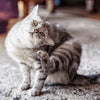5 Most Common Medical Problems in Cats
- by Rufus and Coco
Cats tend to be a lot healthier compared to their canine counterparts, mostly because some spend the entirety of their lives indoors, so they are less exposed to the dangers of the outside world. This is also a reason why they have longer life spans compared to dogs.
But every cat will get sick at one point in their life, so as a pet owner, you should know what to expect. Here are a few of the most commonly encountered health issues cats can experience.
Common Medical Problems in Cats You Should Watch Out For
Parasites
Both internal and external parasites can affect cats as much as any other pet. Even those that only live indoors can get parasites by accident since their owners can catch fleas or parasite eggs or larvae and bring them into their home on their shoes or clothes.
There are many ways to prevent parasite infestations, one of which is deworming. For cats who have nothing against being given a bath, a good product to use is our own Flea Flee treatment shampoo as it works for anything from fleas and lice to adult brown ticks.
Ear infections
Once again, compared to their canine counterparts, cats do not develop ear infections as often. However, if they are exposed to a certain microorganism and if they accidentally get it into their ears while grooming their bodies, they can also get otitis.
It is a good idea to clean your cat’s ears prophylactically, keeping in mind that if there’s no buildup of any tissue or excess wax, you may simply have to massage the area. And if nothing comes out, there’s no need to make things worse. You can try using our Ear & Wound Care cleaner to help remove wax, and treat wounds and inflammation.
Kidney and urinary tract infections
UTIs are extremely common in cats, especially in their senior years, and unfortunately, sometimes they aren’t even associated with a lot of symptoms. Kidney disease, particularly kidney failure, affects geriatric patients, and can be complicated to manage in the long run.
What you can do if you want to prevent your cat from developing a urinary tract infection is to clean your litter box as often as possible. Some cats really don’t like relieving themselves in dirty litter, so they will force themselves to keep it in for hours - which can make the matter a lot worse.
You can make the whole cleanup experience a lot more pleasant by using products such as Elasticised Litter Tray Liners or a Wee Kitty Bamboo Odor Control Litter - the former makes everything easy to pick up without you even coming in contact with your cat’s waste, while the latter attracts smells and absorbs urine quickly.
Dental disease
Every cat parent knows that as they age, cats can begin to suffer from dental health issues much like humans do. But the problem with cats is that they don’t get their teeth cleaned regularly as people do. In time, this can lead to serious complications, including periodontal disease, which can then affect a lot of other organs.
While it's a good idea to try and brush your pet’s teeth every day, sometimes it also helps to put a water additive into your cat’s water so that you can indirectly support healthy gums and teeth - this is exactly what our Breath Buddy can do.
Eye problems
Ocular pathologies are very common in cats, too, and they range from normal ones such as gradual sight loss caused by old age to more worrying ones such as glaucoma.
Cats can also suffer from corneal damage, conjunctivitis, or keratitis. In some cases, these eye health problems are caused by viruses such as FIV or FIP.
Pets that have a kidney complication are also known to have poorer vision compared to their healthy counterparts. For this reason, it’s a good idea to pay attention to your cat’s vision and eye characteristics - if there’s any discharge, any redness, or any inflammation, take them to the vet as soon as possible.
References:
Feline Vision Problems: A Host of Possible Causes, Cornell Feline Health Center, Cornell University College of Veterinary Medicine: https://www.vet.cornell.edu/departments-centers-and-institutes/cornell-feline-health-center/health-information/feline-health-topics/feline-vision-problems-host-possible-causes
Systemic Effects of Periodontal Disease in Cats, N.J. Cave et al, 2012: https://pubmed.ncbi.nlm.nih.gov/23193952/
- Posted in:
- accessories
- cat
- health










